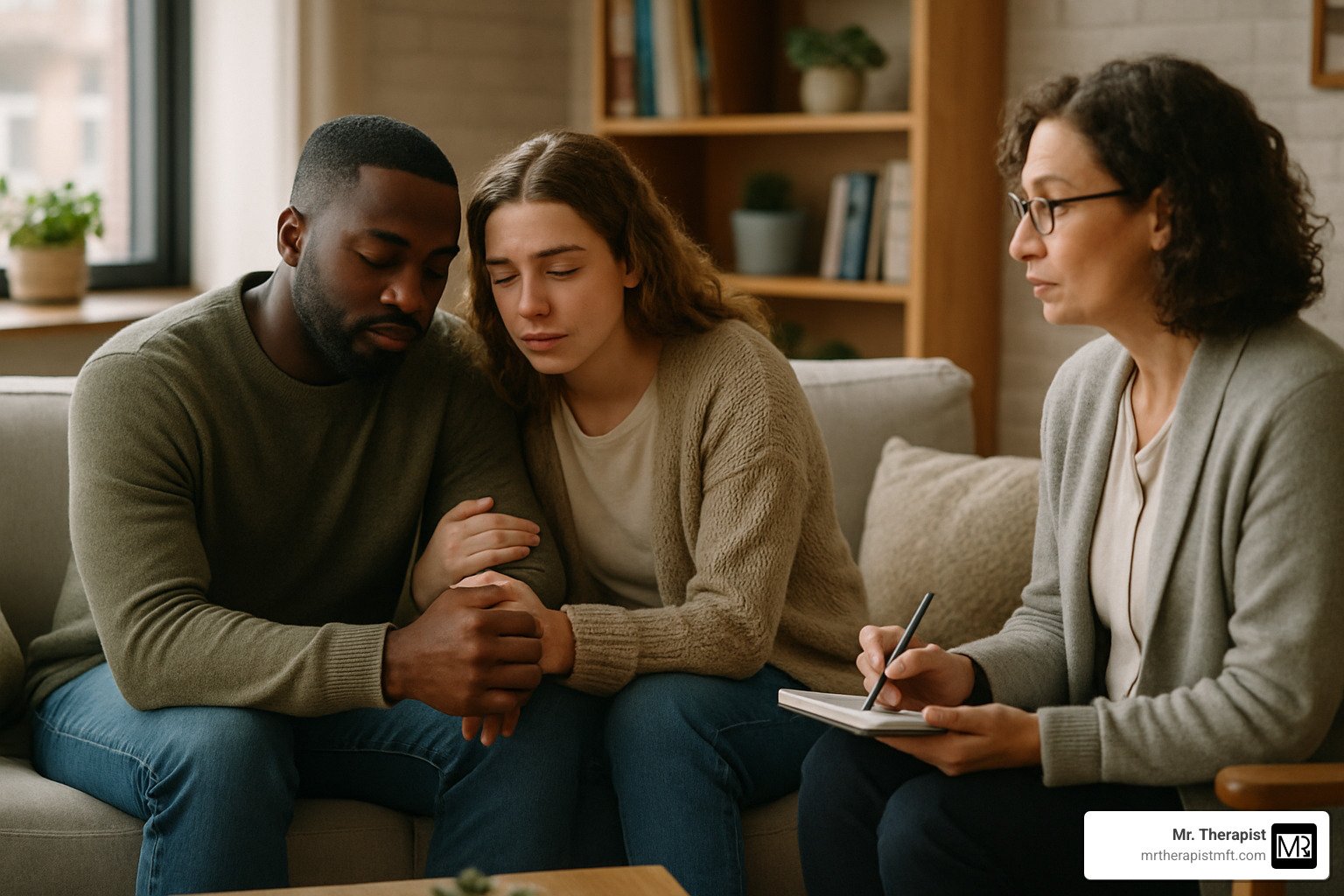
The Cornerstone of Connection: Why Trust Matters
Building trust in relationships is the foundation upon which all healthy connections are built. Without it, even the strongest relationships can crumble under pressure.
To effectively build trust in your relationship:
- Practice honest communication – Share thoughts and feelings openly
- Maintain consistency – Follow through on promises and commitments
- Show vulnerability – Allow yourself to be seen authentically
- Respect boundaries – Honor each other’s limits and needs
- Take accountability – Admit mistakes and make genuine amends
- Express appreciation – Acknowledge your partner’s positive actions
Trust doesn’t appear overnight. It’s built gradually through consistent actions, honest communication, and emotional vulnerability. When we trust our partners, we feel safe enough to be our authentic selves without fear of judgment or rejection.
Like a house needs a solid foundation before walls can rise, relationships need trust before intimacy, security, and long-term commitment can flourish. Research shows that trusting relationships are associated with greater happiness, reduced conflict, and better mental health outcomes.
The challenge many couples face isn’t understanding why trust matters—it’s figuring out how to build it consistently in everyday interactions.
I’m Emmanuel Romero, a Licensed Marriage and Family Therapist who has spent over a decade helping couples develop the skills needed for building trust in relationships through evidence-based approaches that transform emotional disconnection into secure bonds.

Building trust in relationships terms to learn:
– Communication skills for couples
– Couples therapy communication skills
What Is Trust and Why Does It Matter?
Trust in relationships is that warm blanket of security that lets you breathe easy, knowing your partner has your back. It’s believing that the person you love will catch you when you fall – not because they have to, but because they want to. At Mr. Therapist, we often tell our clients that trust is like the foundation of a home – invisible most days, but absolutely essential for everything built on top of it.
Our capacity for trust begins in our earliest days. According to attachment theory, those first relationships with caregivers create a blueprint for how we approach connection throughout life. When baby cries and mom consistently responds, that baby learns the world is safe. When responses are unpredictable, we might grow up expecting disappointment instead of reliability.
Research strongly confirms what we see in our therapy rooms every day. A fascinating 2020 study in PLoS One introduced the Trust Game for Couples as a measurement tool, showing that trust directly correlates with how satisfied and stable a relationship feels.
“I’ve seen it countless times – trust acts as the invisible thread that holds couples together through life’s storms,” says Manny Romero, founder of Mr. Therapist. “With trust, a small disagreement stays small. Without it, even a minor misunderstanding can feel like a threat to the entire relationship.”
Signs You Have (or Lack) Trust
You can feel trust in your bones, but sometimes it helps to name what you’re experiencing.
When trust flourishes, you’ll notice you feel comfortable giving each other space without anxiety. You naturally assume good intentions when communication gets muddy. Most tellingly, you can share your deepest vulnerabilities without armor – knowing your partner will handle your heart with care.
On the flip side, mistrust has its own recognizable patterns. You might feel a compulsive need to check your partner’s phone when they leave the room. Small delays in coming home trigger big worries. You might find yourself withdrawing emotionally as a form of self-protection, building walls instead of bridges.
Cell-phone snooping deserves special mention – it’s a red flag we see often. Recent research published in Psychological Reports found that checking a partner’s phone without permission correlates strongly with relationship distress. While peeking might temporarily ease anxiety, it ultimately erodes the very trust you’re hoping to confirm.
The Cost of Mistrust
Living without trust extracts a steep emotional toll. When mistrust takes root, it can sprout into depression and anxiety as your mind constantly scans for threats. Conflicts escalate because neutral actions get filtered through a lens of suspicion.
Many people develop surveillance behaviors – checking locations, monitoring social media activity, or demanding constant check-ins. These actions create a painful paradox: the more you chase certainty, the more elusive trust becomes.
Perhaps most heartbreaking is the profound loneliness that develops. As one client beautifully expressed, “I was never physically alone, but I felt completely isolated. I couldn’t trust what he said, so I couldn’t truly connect with him either.”
This constant state of emotional vigilance is exhausting. It’s like trying to drive cross-country with your foot hovering over the brake – you’ll never enjoy the journey, and you’ll arrive completely depleted.
Building trust in relationships isn’t a luxury – it’s the essential ingredient that allows love to flourish rather than flounder. The good news? Even when trust has been damaged, it can be rebuilt with intention, consistency, and the right guidance.
Building Trust in Relationships: Core Components & Daily Practices
Building trust in relationships isn’t something you achieve once and check off your list—it’s more like tending a garden that needs regular care to flourish. Through our work at Mr. Therapist, we’ve identified several essential elements that create the foundation of trust, along with everyday practices that strengthen these bonds over time.

Building Trust in Relationships Through Communication
Clear, honest communication sits at the heart of trust-building. It’s not about talking more, but about connecting more meaningfully when you do talk.
When you practice active listening, you give your partner the gift of your full attention. This means putting your phone away, making eye contact, and truly absorbing what they’re saying instead of just planning your response. One client told me, “I knew something had changed when my husband repeated my concerns back to me—not to argue, but because he genuinely wanted to understand how I felt.”
Honest expression means sharing your authentic thoughts and feelings, even when it’s uncomfortable. This doesn’t mean being brutally honest in ways that hurt your partner, but rather expressing your truth with care and consideration.
Learning to respond non-defensively when your partner raises concerns creates safety in your relationship. Instead of immediately jumping to explain or justify, try first acknowledging their perspective with something like, “I can see why that hurt you” before sharing your side.
In our Emotionally Focused Couples Therapy sessions, we help couples recognize how these communication patterns either strengthen or weaken trust. The goal is to become what therapists call “accessible, responsive, and engaged”—creating a space where both partners feel safe to express needs and confident they’ll be met with understanding.
Building Trust in Relationships With Consistency
Consistency might not sound exciting, but it’s actually the secret ingredient in building trust in relationships. When your words and actions reliably align, your partner learns they can count on you.
Follow-through means doing what you say you’ll do—whether it’s calling when you promised, handling a household task, or keeping an important commitment. Each fulfilled promise makes a deposit in what we call your “trust bank.”
There’s comfort in predictability. While spontaneity certainly adds spice to relationships, having reliable patterns provides security. Maybe it’s Sunday morning coffee together, a weeknight walk after dinner, or a monthly date night—these touchpoints become anchors your partner can count on.
Setting up routine check-ins about your relationship helps catch small issues before they grow. These don’t need to be formal “state of the union” discussions—just brief moments to ask, “How are we doing?” and “Is there anything you need from me that you’re not getting?”
In our Relationship Counseling practice, we often hear from partners who feel their trust eroded not through major betrayals but through a pattern of small letdowns. As one client poignantly shared, “It wasn’t one big thing that broke us—it was a thousand tiny disappointments.”
Vulnerability & Emotional Safety
Vulnerability and trust dance together in a beautiful cycle: trust makes vulnerability possible, and vulnerability deepens trust. This positive feedback loop creates increasingly secure bonds.
Self-disclosure means gradually sharing more of your authentic self—your fears, dreams, past wounds, and current struggles. When you let your partner see the real you, piece by piece, you create opportunities for deeper connection.
Responding with validation when your partner shares something vulnerable is crucial. Rather than jumping to problem-solve or minimize their feelings, try simple acknowledgments like “That makes sense” or “I’m here with you” to create emotional safety.

Interestingly, research supports physical connection as a powerful trust-builder. A classic study by Dutton and Aron found that fear-arousal can actually increase attraction. In practical terms, activities that create mild excitement or require mutual trust can deepen your bond.
At Mr. Therapist, we sometimes recommend simple exercises like eye-gazing (sitting face-to-face and maintaining eye contact for 2-5 minutes without speaking) or cuddle sessions where the focus is comfort rather than sex. These practices foster what therapists call “emotional accessibility”—the sense that your partner is available to you on every level.
Boundaries and Mutual Respect
Surprisingly, clear boundaries actually improve trust rather than limiting it. Good boundaries show that you value yourself and the relationship enough to protect it.
Consent matters in all aspects of your relationship—from physical intimacy to sharing personal information with others. Always seeking and respecting your partner’s consent demonstrates that you honor their autonomy and choices.
Everyone deserves some privacy, even in the closest relationships. Respecting this builds trust by showing you don’t need to control or monitor everything about your partner’s life.
In our digital world, discussing digital boundaries has become essential. Some couples share passwords while others maintain separate digital lives. What matters isn’t the specific arrangement but that you’ve mutually agreed to boundaries that work for both of you.
I worked with a couple who created a “phone-free zone” in their bedroom, establishing a space where they could connect without digital distractions. “It’s not about hiding anything,” they explained. “It’s about carving out sacred space just for us.”
Accountability, Apology, and Forgiveness
Nobody’s perfect, and trust isn’t about never making mistakes—it’s about how you handle them when they happen. Taking accountability means owning your actions and their impact without excuses.
When you’ve hurt your partner, expressing genuine remorse focuses on their feelings rather than your intentions. “I’m sorry you felt that way” subtly blames them for their reaction; “I’m sorry I hurt you” acknowledges your responsibility.
Apologies ring hollow without behavior change. Show your commitment by making concrete changes that address the issue and prevent similar hurts in the future.
Dr. John Gottman’s research highlights the importance of “repair attempts”—efforts to make things right after conflict. Couples who build lasting trust recognize and respond positively to these attempts, creating a culture where mistakes can be acknowledged and forgiven.
As we explain in our article on how to listen without judgment, creating space for accountability requires suspending defensive reactions and practicing empathetic listening.
Everyday Habits That Strengthen Trust
Building trust in relationships happens not just in grand gestures but in the small moments that make up daily life. Here are practices that strengthen trust over time:
Creating shared rituals connects you through meaningful routines—whether it’s morning coffee together, a weekly nature walk, or a monthly date night where phones stay home.
Learning your partner’s love languages helps you express affection in ways that truly resonate with them, showing that you care enough to love them in the way they most deeply receive it.
Making a vision board together represents your shared dreams and future, aligning your goals and demonstrating mutual commitment to the relationship’s growth.
What I call reliability micro-actions—returning calls promptly, remembering important dates, arriving when you say you will—might seem small, but they accumulate to build a solid foundation of dependability.
Sending occasional gratitude texts acknowledging something specific you appreciate about your partner reinforces positive connection and encourages trustworthy behaviors.
In our work healing emotional wounds in relationships, we’ve finded that these everyday practices often have more lasting impact than grand gestures. As one client beautifully expressed, “I realized I trusted my partner not because of anything dramatic, but because they consistently showed up for me in small ways that added up over time.”
Repairing Broken Bonds: Rebuilding Trust After Betrayal
When trust shatters, the road to recovery can feel impossibly long. Yet I’ve seen countless couples steer this difficult journey and emerge stronger on the other side. Whether you’re dealing with infidelity, financial secrets, emotional abandonment, or broken promises, healing follows a similar path.

Betrayal cuts so deeply because it forces us to question everything we thought we knew about our relationship. As one of my clients poignantly shared, “It wasn’t just that he lied—it was that I had to question everything I thought I knew about us.” That disorientation is part of the trauma of broken trust.
Here at Mr. Therapist, we work with many couples in the aftermath of betrayal. The encouraging truth is that with genuine commitment and proper support, relationships can not only survive these ruptures but sometimes develop deeper bonds through the healing process. The broken places, when mended with care, often become the strongest parts of the relationship.
The Five-Step Repair Roadmap
While healing isn’t strictly linear (expect some loops and detours), building trust in relationships after betrayal generally follows these essential steps:
1. Naming the Harm
The person who broke trust must fully acknowledge what they did and the pain it caused. This isn’t about sugar-coating with “I didn’t mean to hurt you” but honestly facing the impact: “My actions hurt you deeply, and I take responsibility for that pain.” This accountability creates the foundation for everything that follows.
2. Judgment-Free Listening
The hurt partner needs space to express their pain without interruption or defensiveness. This might be the hardest step for the person who caused harm—sitting with someone else’s pain without trying to explain it away. Yet this witnessing is profoundly healing. The simple act of being fully heard can begin to restore safety.
3. Shared Accountability
While the person who broke trust carries primary responsibility, healing happens within the relationship system. Both partners benefit from examining patterns that may have created vulnerability. This isn’t about victim-blaming but about understanding the relationship’s dynamics so both people can participate in creating something healthier.
4. Concrete Plan
Trust rebuilds through actions, not just words. Together, develop specific steps to prevent similar situations and rebuild safety. This might include increased transparency about whereabouts, joint financial oversight, counseling appointments, or new agreements about boundaries. The specifics matter less than the mutual commitment to change.
5. Time & Patience
Trust returns gradually through consistent, trustworthy behavior over time. There’s no shortcut or quick fix. The timeline varies greatly depending on the severity of the breach and the relationship’s history. Small betrayals might heal in months, while major ones often take years of consistent effort.
Our approach at Mr. Therapist draws heavily from Emotionally Focused Therapy interventions, which help couples identify and transform negative patterns. By addressing the underlying emotions driving these cycles, couples create new, more secure bonds.
I’ll never forget what one client told me after her marriage survived infidelity: “The affair nearly destroyed us, but the healing process forced us to build something entirely new—something actually stronger than what we had before because now we truly understand each other’s emotional needs.” Her experience reflects what research confirms: relationships can emerge more resilient after successfully navigating betrayal.
Measuring Progress & Knowing When to Seek Help
How do you know if trust is actually being rebuilt? Dr. John Gottman suggests using a simple “trust metric”—regularly rating how much you trust your partner on a scale of 0-100. Tracking this number over time helps you see progress that might otherwise be invisible during the day-to-day healing process.
Regular emotional check-ins also help gauge progress. Ask yourself: Do I feel safer expressing my needs now? Am I less preoccupied with worries about betrayal? Are we creating new positive experiences together? Has my partner demonstrated consistent change in behavior? Your honest answers reveal whether healing is occurring.
For those who prefer more structured assessment, researchers have developed formal measures like the Trust Game for Couples (TGC), which evaluates trust through specific exercises and questionnaires.
While some couples successfully rebuild trust on their own, professional help often makes the difference between relationship recovery and relationship ending. Consider therapy especially if you’re experiencing:
Trauma triggers that repeatedly activate fight-flight-freeze responses when discussing the betrayal
Communication breakdowns where conversations about trust quickly escalate into blame or shutdown
Persistent anxiety or depression related to the betrayal that isn’t improving with time
Repeated betrayals suggesting deeper patterns that need professional intervention
Inability to move forward despite genuine efforts from both partners
If you’re in Orange County, our team at Mr. Therapist offers couples counseling specifically designed to help rebuild trust using Emotionally Focused Therapy techniques. We create a safe space where both partners can process painful emotions and gradually rebuild the secure connection that makes trust possible again.
Seeking help isn’t a sign of relationship failure—it’s a commitment to healing. Sometimes the bravest step in building trust in relationships is acknowledging you need support along the way.
Frequently Asked Questions about Building Trust in Relationships
How long does it take to build (or rebuild) trust?
When couples ask me this question in therapy, I often smile and say, “How long is a piece of string?” The truth is, trust doesn’t follow a neat timeline. For new relationships, you’ll typically start feeling that foundation of basic trust after a few months of consistently showing up for each other. But the deeper trust? That’s something that continues to unfold throughout your entire relationship.
Rebuilding trust after it’s been broken is a different journey altogether. For significant breaches like infidelity, most couples need about 1-2 years of intentional work before they feel secure again. Several factors influence this timeline:
The depth of the wound matters—a single lie about something small heals faster than long-term deception. Your relationship history plays a role too; couples with a strong foundation before the breach often recover more quickly. Most importantly, both partners need to be genuinely committed to the healing process.
As I often tell clients at Mr. Therapist, “Trust is rebuilt brick by brick, not all at once. Each time you follow through on a promise, each honest conversation, each vulnerable moment—that’s another brick in your new foundation.”
Can you measure trust in a relationship?
While trust feels like this intangible thing floating between you and your partner, there are actually several ways to get a handle on where you stand.
The simplest approach is asking yourself some honest questions: How confident do you feel that your partner genuinely cares about your wellbeing? Can you be vulnerable without fear? Do their actions consistently match their words? How anxious do you feel when they’re not responding to texts or calls?
For those who love more structured approaches, relationship researchers have developed formal assessments like the Trust in Close Relationships Scale and the Trust Game for Couples (TGC).
In my practice, I often use a simple but powerful exercise where partners rate their trust on a scale from 0-100 and then discuss specific actions that would move that number higher. One client told me, “Seeing our trust as a number somehow made it less overwhelming—suddenly we had concrete goals instead of this vague feeling that something was wrong.”
When should we seek professional help for trust issues?
Trust issues don’t always require professional help, but there are clear signals that it’s time to reach out:
You’re caught in what therapists call a negative cycle—having the same fights about trust over and over despite your best efforts to resolve them. Or perhaps past trauma is being triggered by current trust challenges, making it nearly impossible to separate what happened then from what’s happening now.
Another red flag is when your attempts to talk about trust problems consistently lead to bigger arguments rather than understanding. This usually means you need a neutral third party to help translate between you.

Pay attention to your mental health, too. If trust issues are causing significant anxiety, depression, or intrusive thoughts that disrupt daily life, that’s your mind and body telling you some professional support would be helpful.
Finally, if you’ve been genuinely trying for several months with little improvement, it’s probably time for some outside perspective.
At Mr. Therapist, we specialize in Emotionally Focused Therapy, which helps identify the deeper attachment needs and fears driving trust issues. A therapist doesn’t just referee your arguments—they help you see the underlying patterns and create new ways of connecting.
One couple I worked with put it beautifully: “We’d been trying to fix our trust issues for years on our own. Our therapist helped us see that we were actually having two completely different conversations—once we understood what was really happening beneath the surface, everything changed.”
Conclusion
Building trust in relationships is both an art and a science—requiring consistent effort, emotional courage, and practical skills. At Mr. Therapist, we’ve seen countless couples transform relationships marked by suspicion and distance into secure, trusting bonds where both partners feel safe to be their authentic selves.
The Emotion-Focused approach we use at our practice is particularly effective because it recognizes that emotions aren’t obstacles to overcome but valuable tools for healing. By accessing and changing the deeper feelings beneath trust issues—often fear, shame, or loneliness—couples can create new patterns of connection.
Trust isn’t static; it requires ongoing maintenance through:
– Honest, empathetic communication
– Consistent reliability in both words and actions
– Courage to be vulnerable and authentic
– Respect for boundaries and individual needs
– Accountability when mistakes occur
– Daily habits that reinforce connection
When these elements are present, relationships develop what attachment theorists call a “secure base”—a foundation of safety from which both partners can explore, grow, and thrive individually and together.
As Manny Romero often says, “The quality of your relationship determines the quality of your life.” By investing in building trust in relationships, you’re not just improving your connection—you’re enhancing your overall wellbeing and creating a legacy of secure attachment that can influence generations to come.
If you’re struggling with trust issues in your relationship, seeking help is a sign of commitment, not weakness. Our team at Mr. Therapist is here to support your journey toward a more secure, trusting relationship through our specialized services in San Clemente and throughout Orange County, California.
Building trust takes time, but the rewards—deeper intimacy, greater joy, and lasting security—are well worth the effort.



